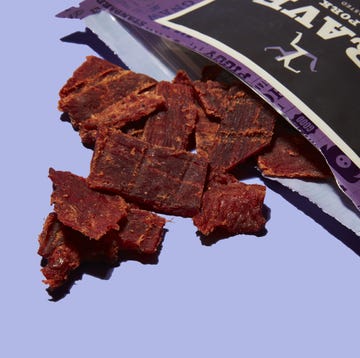In the past few years, hummus has rocketed to supermarket stardom. This chickpea dip takes up almost an entire section in the grocery store, even though a quarter of Americans still don’t know what it is. If you’re still in the dark about it, it might be time to turn on the refrigerator light and start dipping. A study in the Journal of Nutrition and Food Sciences found that hummus eaters have smaller waists and are healthier overall.
The researchers pulled data about chickpea and hummus consumption from the National Health and Nutrition Examination Survey and found that hummus eaters take in 52 percent more fiber, 13 percent more good-for-you polyunsaturated fats (despite an overall lower intake of fat), and 20 percent less sugar than non-consumers. Plus, people who eat the chickpea-based dip are healthier eaters overall, packing in more servings of fruit, dark green veggies, and whole grains per day.
Not surprisingly, this translates to benefits you can see: Hummus fans' waists are, on average, eight percent smaller than the waists of people who don't eat the dip, the study found. They also tend to weigh less, even though they take in no fewer calories overall.
What makes hummus such a super food? It's loaded with slow-digesting carbs, belly-filling fiber, and protein to help you stay satisfied longer, the scientists say. In other words, it's pretty much the perfect snack.
If you're buying pre-made hummus, look for one made with olive oil instead of a cheap substitute. You should also be sure to watch your portion size; one serving is usually just two tablespoons, and the calories can add up fast, even though they're the good-for-you kind. Making your own? Rinse canned chickpeas before pulverizing them to reduce the sodium content of your dip, the researchers suggest.
This article originally appeared on Women’s Health.













